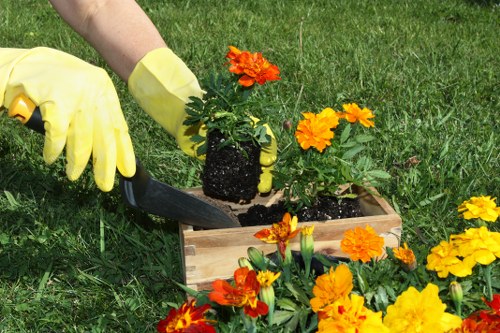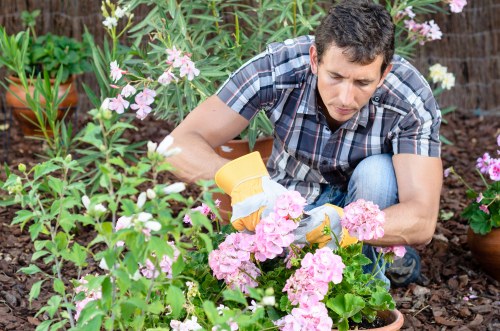Effective Oil Stain Removal for Driveways in Loughton

Keeping your driveway clean not only enhances the curb appeal of your home but also prevents long-term damage. Oil stains are one of the most common issues homeowners in Loughton face. Whether it's from vehicle leaks, gardening equipment, or accidental spills, oil stains can be stubborn and unsightly.
Addressing oil stains promptly is crucial. If left untreated, these stains can seep into the driveway's surface, making them harder to remove and potentially causing structural damage over time. Fortunately, there are effective methods available to tackle these stubborn stains.
In this guide, we'll explore the best practices for oil stain removal on driveways in Loughton, ensuring your driveway remains clean and well-maintained throughout the year.

Understanding Oil Stains
Oil stains on driveways typically originate from motor oil, diesel, or even home-based cooking oils. These substances contain hydrocarbons that bond strongly with the driveway material, whether it's concrete, asphalt, or paving stones.
The composition of your driveway determines the best removal method. For instance, concrete driveways have a porous surface that absorbs oils, while asphalt is more resilient but still susceptible to staining over time.
Identifying the type of oil and the driveway material is the first step towards effective stain removal. This knowledge allows you to select the most suitable cleaning agents and techniques.

Top Methods for Removing Oil Stains
1. Absorbent Materials
One of the simplest ways to tackle fresh oil stains is by using absorbent materials. Products like kitty litter, baking soda, or sawdust can help soak up excess oil before it penetrates deeper into the driveway.
- Kitty Litter: Spread a generous amount over the stain and let it sit for several hours.
- Baking Soda: Sprinkle baking soda on the stain and scrub with a brush after letting it sit.
- Sawdust: Similar to kitty litter, sawdust can effectively absorb oil from the surface.
After absorption, sweep away the materials and dispose of them properly to prevent environmental contamination.
2. Detergent and Hot Water
For older or more stubborn stains, a mixture of strong detergent and hot water can break down the oil effectively. Use a stiff brush to scrub the area vigorously.
- Steps:
- Apply detergent directly to the stain.
- Add hot water to create a soapy mixture.
- Scrub the area thoroughly.
- Rinse with clean water.
This method works best on concrete driveways but can also be effective on asphalt with proper rinsing.

Advanced Oil Stain Removal Techniques
1. Pressure Washing
Pressure washing is a highly effective method for removing deep oil stains. The high-pressure water jets can penetrate porous surfaces, dislodging embedded oil particles.
- Advantages: Quick and thorough cleaning.
- Considerations: Requires access to a pressure washer and proper safety precautions.
For best results, combine pressure washing with a suitable detergent designed for oil removal.
2. Commercial Oil Removers
There are numerous commercial products available specifically formulated to tackle oil stains. These chemical cleaners can break down petroleum-based stains effectively.
- Application: Follow the manufacturer's instructions for optimal results.
- Safety: Ensure proper ventilation and protective gear when using strong chemicals.
Always test a small area first to ensure the product does not damage the driveway material.
3. Eco-Friendly Solutions
For environmentally conscious homeowners, there are eco-friendly oil stain removers available. These products use natural ingredients to break down oil without harming the surrounding environment.
- Options: Enzyme-based cleaners, vinegar, and baking soda mixtures.
- Benefits: Safe for pets, plants, and waterways.
While they may require more effort, eco-friendly solutions offer a sustainable approach to driveway maintenance.

Preventing Future Oil Stains
Preventative measures can significantly reduce the occurrence of oil stains on your driveway. Here are some tips to keep your driveway clean:
- Regular Maintenance: Clean your driveway periodically to prevent oil buildup.
- Use Protective Mats: Place mats or trays under vehicles prone to leaks.
- Immediate Attention: Address spills as soon as they occur to prevent deep penetration.
- Seal Your Driveway: Applying a sealant can create a protective barrier against oil and other contaminants.
Implementing these strategies not only keeps your driveway looking its best but also extends its lifespan.
Local Services in Loughton
For those who prefer professional assistance, several local services in Loughton specialize in oil stain removal. These experts use advanced techniques and equipment to ensure your driveway is spotless.
- Loughton Clean Driveways: Offering comprehensive cleaning services with eco-friendly products.
- East London Pressure Washing: Specialized in high-pressure cleaning for stubborn stains.
- Green Solutions Loughton: Focused on sustainable cleaning methods.
Hiring a local professional ensures tailored solutions that cater to the specific needs of your driveway and the local environment.
Nearby Areas Serving Oil Stain Removal
Residents in and around Loughton can access oil stain removal services in several nearby areas. Each area offers unique features catering to different preferences and requirements.
- Buckhurst Hill: Just east of Loughton, known for quick response services.
- Chigwell: Offers eco-friendly cleaning options and personalized service.
- Hainault: Specializes in high-pressure washing and commercial driveway maintenance.
- Theydon Bois: Provides comprehensive stain removal with a focus on long-term protection.
- Debden: Renowned for affordable pricing and reliable services.
- Grange Hill: Offers both residential and commercial cleaning solutions.
- Roydon: Features advanced cleaning technologies for tough stains.
- Highams Park: Focuses on sustainable and eco-friendly cleaning practices.
- Tulip Road: Known for thorough cleaning and excellent customer service.
- Fiddlers Hamlet: Provides tailored solutions to meet specific driveway needs.
- Fairlop: Offers a range of services from basic cleaning to deep stain removal.
- Stayton Street: Known for their expertise in different driveway materials.
- South Loughton: Provides prompt and efficient cleaning services.
- Chinbrook: Offers both DIY kits and professional services.
- Church End: Known for their meticulous cleaning techniques.
Choosing the Right Method for Your Driveway
Selecting the appropriate oil stain removal method depends on several factors, including the driveway material, the age of the stain, and environmental considerations.
Assessing the Driveway Material
Different materials require different cleaning approaches:
- Concrete: Highly porous and may need stronger detergents or pressure washing.
- Asphalt: More resilient but still benefits from sealants post-cleaning.
- Paving Stones: May require careful scrubbing to avoid dislodging stones.
Evaluating Stain Severity
Fresh stains are easier to remove compared to older, set-in stains. Early intervention with absorbent materials can prevent deeper penetration.
Environmental Impact
Consider environmentally friendly options to minimize the ecological footprint. Eco-friendly cleaners and sustainable practices ensure the safety of your garden and local waterways.
DIY vs. Professional Services
Deciding between a DIY approach and hiring professionals depends on the extent of the stain and your comfort level with the methods.
DIY Methods
DIY methods are cost-effective and suitable for minor stains. They allow you to address the problem immediately without waiting for professional availability.
- Best for small to medium-sized stains.
- Requires patience and the right materials.
Professional Services
For extensive or particularly stubborn stains, professional services offer expertise and advanced equipment that can ensure thorough cleaning.
- Ideal for large driveways or severe staining.
- Provides long-term maintenance solutions.
Maintaining a Clean Driveway
Regular maintenance is key to preventing oil stains and keeping your driveway in top condition. Here are some maintenance tips:
- Regular Sweeping: Remove debris and prevent dirt accumulation.
- Seal Your Driveway: Apply a sealant to create a protective barrier.
- Immediate Spill Cleanup: Address spills promptly to prevent deep staining.
- Periodic Deep Cleaning: Schedule deep cleaning sessions to maintain cleanliness.
By incorporating these practices, you can significantly reduce the likelihood of oil stains and extend the lifespan of your driveway.
Conclusion
Oil stain removal on driveways in Loughton doesn't have to be a daunting task. With the right methods and regular maintenance, you can keep your driveway looking pristine and prevent long-term damage.
Whether you choose to tackle the stains yourself or hire a local professional, understanding the best practices ensures effective and lasting results. Embrace these strategies to maintain a beautiful and functional driveway for years to come.
Frequently Asked Questions
1. How soon should I clean an oil stain on my driveway?
It's best to address oil stains as soon as possible. The longer the oil sits, the more it penetrates the driveway material, making it harder to remove.
2. Can I use household cleaners to remove oil stains?
Yes, household cleaners like dish soap, baking soda, and vinegar can be effective for minor stains. However, for tougher stains, specialized cleaners or professional services may be necessary.
3. Is pressure washing safe for all types of driveways?
Pressure washing is generally safe for concrete and asphalt driveways. However, delicate surfaces like certain paving stones may require a gentler approach to avoid damage.
4. How can I prevent future oil stains on my driveway?
Prevent future stains by regularly maintaining your driveway, using protective mats under vehicles, promptly cleaning spills, and applying a sealant to create a protective barrier.
5. Are there eco-friendly options for oil stain removal?
Yes, there are eco-friendly oil stain removers available that use natural ingredients. These options are safer for the environment and suitable for households with pets and children.


